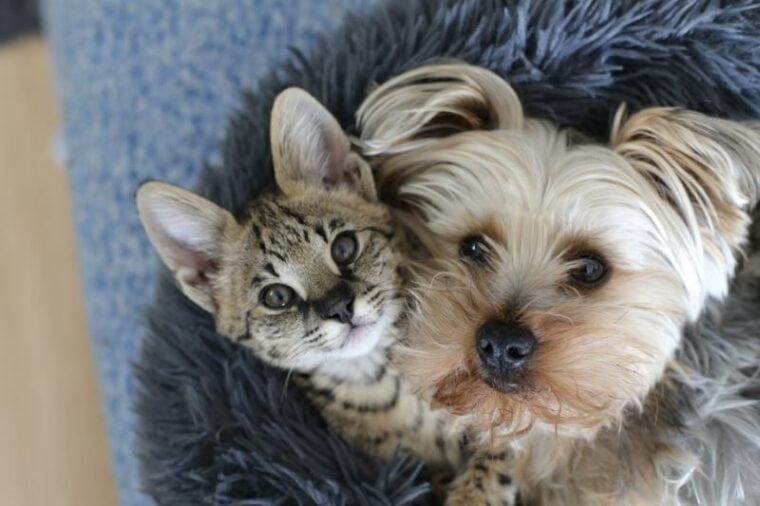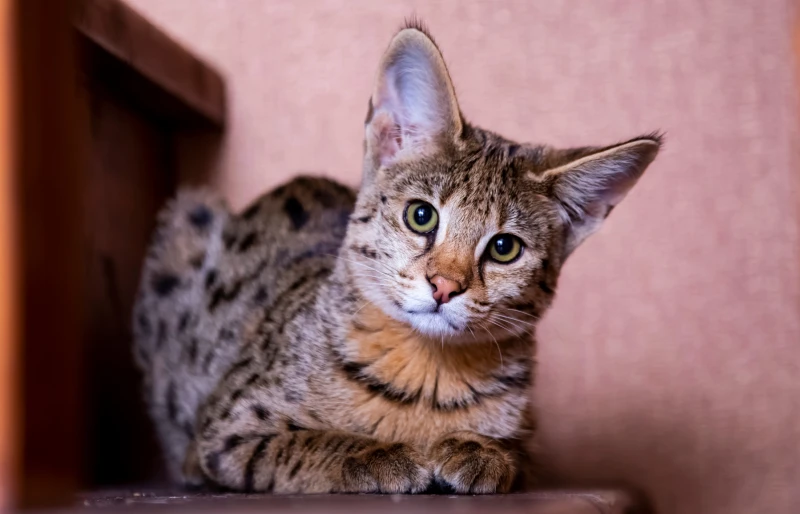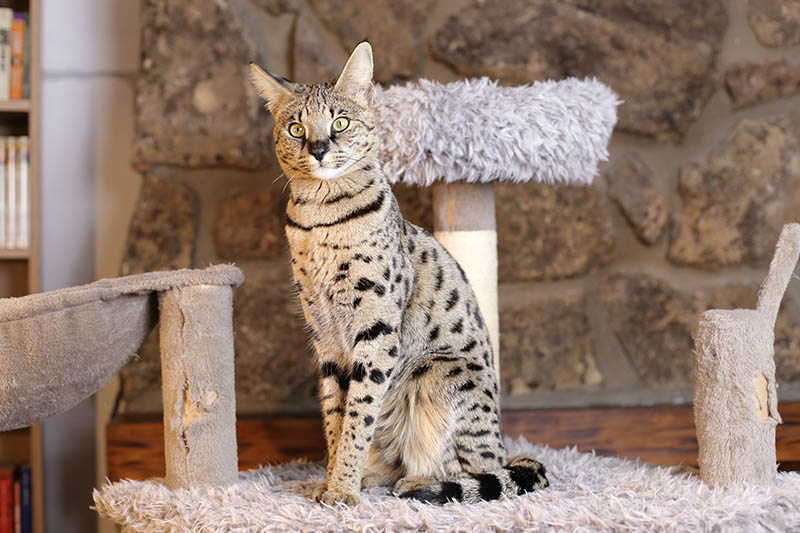
If you love both cats and dogs, you likely want to figure out the best way to introduce a new cat to your dog, as not every cat will get along with every dog.
So, if you have your eye on the gorgeous Savannah cat and are wondering if they will get along with your dog, it’s absolutely possible, but it does depends on several factors.
In this article, we discuss the best way to introduce a cat to your dog and take a close look at the Savannah’s temperament.
What Exactly Is a Savannah Cat?
First, let’s tackle the Savannah’s temperament and what exactly went into the creation of this cat. The Savannah is a cross between the Serval and a domestic cat. The Serval is a small to medium-sized wild cat from Africa that happens to have the largest ears of any cat!1 Their coats are a tawny color, with a combination of spots and black lines.
The first Savannah was created in 1986 between a male African Serval and a female Siamese.

What Does F1, F2, etc. Mean?
When you look at Savannah cats available for purchase or adoption, you’ll likely notice “F1,” “F2,” “F3,” etc. in their descriptions.
The F stands for “filial,” which is Latin for “son” or “daughter,” and the numbers are the generations. So, an F1 Savannah has a Serval father (usually) and a domestic cat mother, and an F2 has a Serval grandparent, and so on. The closer the relationship to the Serval, the wilder the Savannah will be.
F1 cats are the most expensive, and their temperament will be quite difficult to predict, but when you get down into the F4s or F5s, you’ll have a cat that’s closer to a regular domestic cat. In fact, F4 Savannahs are the true distinct Savannah cats. The previous generations (F1, F2, F3) are considered wild-domestic hybrids.
In this article, we only discuss F4 (or higher) Savannahs because these cats are the best options for cat owners.
Do Savannahs Get Along With Dogs?
Yes! These larger-than-normal cats have even been described as almost dog-like. They are curious, social, playful, and affectionate, and they form strong bonds with their humans.
If the dog is cat-savvy and friendly, there’s every chance that they will get along fine with your Savannah. A Savannah kitten in particular will have an even better chance of accepting a dog as a companion. But if your cat is at all shy or aggressive, it might not work.
It all comes down to the temperament of the dog and the cat, as well as their backgrounds and how they are introduced.

The Background of the Savannah Cat and the Dog
If you buy a Savannah kitten from a breeder, their background will be shared with you. If your dog was a rescue, there might be an issue if there’s any known history of aggression, particularly if it has been directed toward cats.
Some breeds of dogs don’t always do well around cats, primarily those with a high prey drive, like many hounds and terriers.
But things should go well if your dog has been around cats before and is comfortable around them. That said, check with the Savannah breeder about their cats’ exposure to dogs.
Many breeders will live with the kittens underfoot, meaning they live with the family and other pets, which might include dogs. Your best bet is to find a breeder who has previously exposed their kittens to dogs.
Differences in Age and Size
If the cat and dog are close in age and size, that might make things go more smoothly. Having a boisterous young kitten with a calm older dog might not be the best match.
If they can play together, they can form a strong bond, even though they are different species. That said, there are many cases of older dogs looking after young kittens, so nothing is entirely impossible.

Before You Bring the Savannah Home
There are several steps that you should take before you bring the cat home. If you have time before you need to pick up the cat, take a blanket that your dog has been in contact with to the cat, and likewise, bring a blanket from the cat to your dog. This way, they can get to know each other’s scent.
Also, ensure that your dog has had all the essential obedience training. This way, it will be easier to get your dog under control if things go sideways.
You should have set up a safe space for the cat. They will need at least one tall cat tree, and a few cat shelves would be quite beneficial. Cats feel safest when they are up high, so they need a few escape routes in case they get frightened.
Introducing a Savannah Cat and a Dog
When you bring the Savannah home for the first time, keep your pets separate. Place one of them in a room with the door closed, and allow them to sniff each other under the door.
If this goes well, you can gradually increase their interactions, which can include closer proximity. This should only be done when they are both calm and relaxed. Eventually, you can allow limited time together, albeit constantly supervised.
As long as this continues to go well, increase the time that they spend together, but only leave them unsupervised when you are confident that they are getting along and are both safe with each other.
Remember to watch their body language: If they are both alert and curious without any obvious signs of aggression or fear, things are going well. Immediately separate them the moment that you notice any worrisome body language.
Never punish either animal, but do use positive reinforcement when they interact well with each other. Treats and pets will go a long way.
Final Thoughts
With the right introductions and plenty of time and patience, your Savannah cat and your dog will likely get along quite well.
Remember that you’ll want to avoid F1–F3 Savannahs, as they are much closer to their wild ancestors. They are more likely to engage in hunting behavior and will be larger and more unpredictable than a domestic cat. Your dog might not have a chance!
Consider speaking to your vet and an animal behaviorist before taking this step, as they will likely offer great advice. The slower you take the introductions and the calmer you are throughout, the more likely you’ll have two new companions who enjoy playtime and good snuggle sessions with each other.
Featured Image Credit: AJR_photo, Shutterstock








